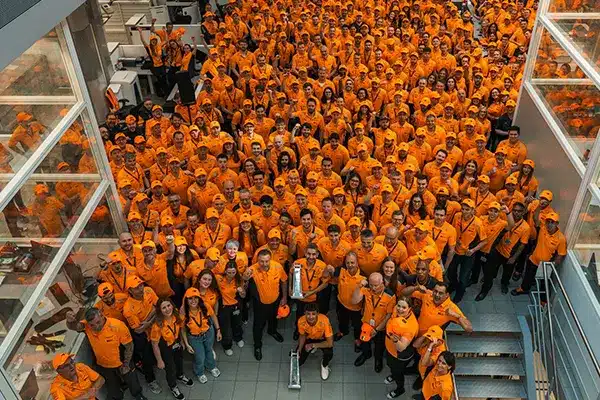McLaren F1 now sees 30% of its team from diverse backgrounds, blending competitive success with environmental consciousness.
Last month, F1 reviewed its sustainable development goals: as a reminder, the sport aims to achieve carbon neutrality by 2030. However, it is still far from this target, as emissions have only been reduced by 13% since 2018.
F1, of course, depends on the other teams to meet its goal.
Fortunately, all F1 teams are labeled ‘three stars’ by the FIA in terms of sustainable development.
Beyond the label, progress is evident, such as with McLaren F1.
The team revealed that it had, for instance, reduced its carbon emissions by 25% compared to 2019, which is about twice the overall F1 reduction.
The energy used at Woking is also sourced entirely from renewable production.
In detail, McLaren F1 reports the following progress:
— 25% reduction in carbon emissions (Scope 1 and 2) compared to 2019
— An average reduction of 9.6% in air freight emissions since 2021 thanks to the shift to sea freight
— A 16% reduction in emissions per race compared to 2022 across all series
— The highest-ranked motorsport team in the Global Sustainability Benchmark in Sports
— The first motorsport team to have externally validated net-zero targets through the Science-Based Targets initiative
— 100% renewable electricity used at McLaren sites
— Pioneering use of recycled carbon fibers in F1 race cars
— Development of a new suite for the Paddock Club, recycling, reusing, and reallocating 24.4 tonnes of old equipment.
McLaren F1 also leads in diversity
The second aspect of sustainable development is inclusion and diversity. Here too, McLaren F1 has reported significant progress.
45% of McLaren F1’s new hires come from underrepresented backgrounds, including women, ethnic minorities, people with disabilities, the working class, and the LGBT community.
In total, the team specifies, 29% of the staff comes from underrepresented groups, compared to only… 3% in 2022!
To further increase this number, McLaren F1 has launched a scholarship program that will fund the education of 60 women in STEM fields. McLaren F1 has also formed a partnership with Racing Pride to help change attitudes.
Furthermore, in line with Lando Norris’s commitment to mental health, McLaren F1 has also trained 7% of its staff on these issues.
In the same spirit, the team has invested in new wellness structures, real havens dedicated to staff at its Woking factory, which will be accessible 24/7.
Kim Wilson, Director of Sustainability at McLaren Racing, commented on the team’s progress:
“Establishing the standard for high performance in sport does not stop at the track, and in 2023, we have really strived to review our data and insights more thoroughly to be able to benchmark against best practices. The external validation of our strategy and approach by the Global Sustainability Benchmark in Sports, the Science Based Targets Initiative, and the Carbon Trust means we are on the right track. I am immensely proud of the hard work and dedication shown by all sectors of the company.”
“The competitive nature of sport sometimes makes collaboration (between teams) counterintuitive, but we cannot allow this to slow down the pace of our progress in this area. We need greater transparency and reporting standards across the sport for our collective credibility and to better act. We recognize that the path to net carbon is not linear for anyone, and we acknowledge that the fantastic growth we have seen in our sport around the world must be balanced against our overall impact on the planet.”
Zak Brown, CEO of McLaren Racing, has emphasized that performance and staff well-being are complementary in sport.
“Our approach to minimizing the impact of our team and our sport on the planet continues, and the challenges we face collectively are incredibly complex. We will undoubtedly encounter obstacles on our path towards a more sustainable future, but it is important to recognize that as a team—and as a sport—we have come a very long way and there is much to be proud of.”
“Whether it’s the pioneering use of recycled carbon fibers in our F1 cars, opening up more pathways into our sport, or bringing our race engineers together with marine biologists who are on a mission to preserve the Great Barrier Reef, we are moving forward. And I am grateful to our McLaren Racing colleagues who continue to set the standard for high performance, both on and off the track.”
“Only true collaboration with our partners, the other teams, the rights holders (Formula One Management), and the regulatory authorities (FIA) will enable us to make significant changes across the industry over the coming years—and I am excited to see what we can achieve together.”

- You may also like>Piastri Shines in Miami: McLaren Commends His Skill
- Following us on Facebook et Twitter
McLaren F1 Boosts Diversity, Marries Performance and Sustainability. McLaren F1 Boosts Diversity, Marries Performance and Sustainability

